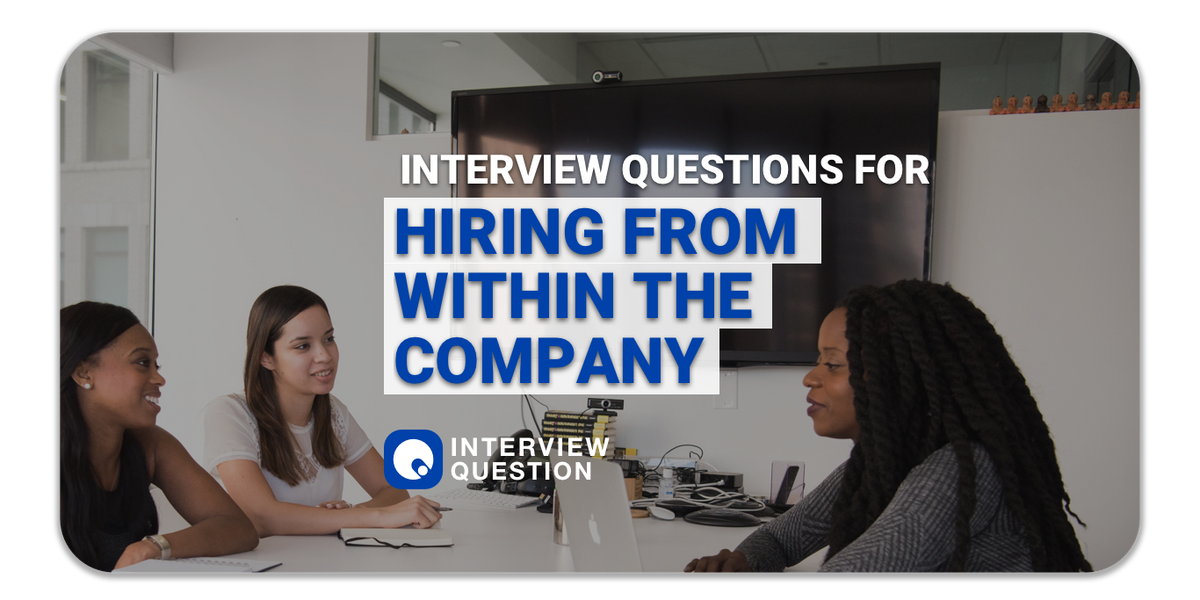Interview questions for hiring from within the company
Are you looking for questions to ask when hiring someone from within your company? Check out this list of interview questions to get started.

When it comes to promotions and re-hiring, interview questions for internal candidates can be tough to nail.
You want to find out if the candidate is truly qualified and has the right skillset for the job, but you also don’t want to come off as unfair or biased.
After all, you’ve probably worked with this person before and know them pretty well.
So how do you strike the perfect balance?
Here are some great interview questions to ask internal candidates that will help you make the best decision for your company.
Critical internal candidate interview questions
The most strategic questions when interviewing someone from within the same company are those that focus on why they want to leave their current position and what they feel they can improve upon in a new role.
Asking about specific areas of improvement shows that you’re interested in their professional development, and also allows you to probe into whether or not they’re truly committed to making a change.
Other important questions include inquiries about how they would approach solving various challenges that may come up in the new role, as well as what motivates them both professionally and personally.
By taking the time to ask these types of questions, you can gain valuable insights into whether or not an internal candidate is right for the job.
Let the candidate lead the conversation by primarily asking open ended questions
An internal candidate undergoing an in-house interview would have been accustomed to the working styles and culture. Open ended questions allow the interviewee to take control of the conversation and really sell themselves as being the best person for promotion.
You need to let the interviewee express their strengths and what more they have done (or can still do) for the company. Some of these aspects may not be immediately apparent to his or her direct manager or to HR.
Try asking things like:
- What do you think makes our company culture unique?
- How do you think we could improve communication between departments?
- Do you see any areas where our processes could be streamlined?
Dig into the interviewees management styles
Most promotions require the newly roled person to manage the performance of a team. This means that you will likely be managing people who have been in their roles longer than you have.
It is important to understand how they like to be managed and what motivates them so that you can help them reach their potential while also meeting company objectives.
Do a 360-degree peer interview to assess past performance and suitability
Colleagues are the best testament to an employee's past performance and suitability for a new role. To get an accurate picture of an internal candidate, it's important to do a 360-degree peer interview.
This means talking to people who have worked with the candidate in different capacities, such as direct reports, teammates, and superiors.
Deep-dive into how a candidate performs communication and collaboration activities
Internal candidates have an advantage over external ones when being interviewed for a promotion because the interviewer is already familiar with their work habits. However, this doesn’t mean that an internal candidate’s interview should be a cakewalk.
The interviewer will still want to deep-dive into how the candidate performs communication and collaboration activities, as these skills are crucial for success in any leadership role.
Some questions the interviewer might ask include:
- Can you give me an example of a time when you had to manage conflict within your team?
- How do you handle delivering criticism?
- What are some strategies you use for communicating difficult news to your staff?
Uncover motivations of the internal candidate before shortlisting them
Without sounding too rehearsed, candidates should be honest about your reasons for wanting the role.
If you’re simply looking for a change of scenery or more money, those won’t suffice as convincing arguments.
However, if you have specific things that you want to learn or accomplish in the new position, mention them.
A good example will be:
“I’ve been with the company for four years and I love it here. In my current role I don’t get to use my creativity as much as I would like to – something that I know is essential in this department. With this job, I feel like I could really stretch myself professionally and contribute in a meaningful way."
Let the interviewees know you have other choices and aren't limited to searching from within
Consider letting the interviewees know that you have other choices and aren't limited to searching from within. This will help them understand that you're serious about finding the right person for the job, and not just settling for whoever is available.
It also shows that you're willing to invest time and resources into finding the best candidate, which can be a valuable selling point when trying to attract top talent. In this way an internal candidate won't be too vile to ask for a cut-throat salary or an inappropriately high job title.
